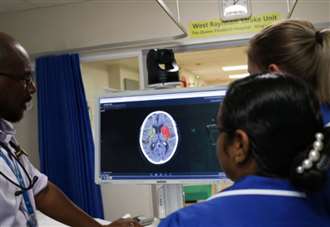
New Artificial Intelligence technology is being used to help stroke patients in hospital.
The Queen Elizabeth Hospital, in Lynn, has been using AI to deliver care to stroke patients faster than before.
‘Brainomix’, an AI medical software, allows for CT scans to be sent directly to an app which shows the areas of the patient’s brain that need immediate medical attention.
This computer technology means that instant scan results can be given which speeds up the treatment process.
Additionally, the system can be accessed with a mobile device, making it available any time, in any place.
The Trust began using the technology at the end of July and, in the first two months of use, 40 patients have benefited from faster results with a total of 85 scan results being sent via the app.
Dr Leslie Mtariswa, clinical director for stroke medicine at QEH said: “We are thrilled to have artificial intelligence here at QEH in the form of the Brainomix technology app. This software is capable of producing enhanced brain imaging that enables stroke physicians to make quick and accurate clinical diagnoses and decisions.
“It is a great achievement to be amongst pioneers in a league of Trusts offering this treatment, aided by Brainomix, to our patients.”
This Sunday is World Stroke Day, which aims to improve awareness and understanding of strokes.
To show their support, the Corn Exchange and QEH day surgery will be lighting their buildings in blue.
Jodie Tillett, lead stroke nurse, at QEH said: “When someone has a stroke, it is so important that they seek medical attention immediately. What is equally as important is that they then receive the most appropriate treatment in a timely way.
“Artificial intelligence is an assistive tool that enables the clinician to assess the location and severity of changes in the brain, make a quicker diagnosis and support decision making for time-critical treatments in acute stroke. This is a very exciting development for the Stroke service in Kings Lynn, and one that will have a positive impact on patient outcomes”














